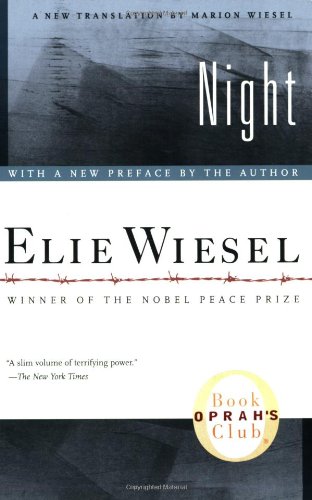All Nonfiction
- Bullying
- Books
- Academic
- Author Interviews
- Celebrity interviews
- College Articles
- College Essays
- Educator of the Year
- Heroes
- Interviews
- Memoir
- Personal Experience
- Sports
- Travel & Culture
All Opinions
- Bullying
- Current Events / Politics
- Discrimination
- Drugs / Alcohol / Smoking
- Entertainment / Celebrities
- Environment
- Love / Relationships
- Movies / Music / TV
- Pop Culture / Trends
- School / College
- Social Issues / Civics
- Spirituality / Religion
- Sports / Hobbies
All Hot Topics
- Bullying
- Community Service
- Environment
- Health
- Letters to the Editor
- Pride & Prejudice
- What Matters
- Back
Summer Guide
- Program Links
- Program Reviews
- Back
College Guide
- College Links
- College Reviews
- College Essays
- College Articles
- Back
Night by Elie Wiesel
“Night” by Elie Wiesel is a heartbreaking account of life lived in fear in Nazi concentration camps, specifically Auschwitz and Buchenwald. Elie describes the camp’s way of life in an effective and strangely cold manner, bringing us to the front of the emotional and physical abuse endured day after day in his youth.
Elie’s writing style is brisk and factual. He describes the scene with all the necessary detail and completes images with striking adjectives. Such phrases, “His body was completely twisted, shriveled up into himself. His eyes were glazed over, his lips parched, decayed.” As seen on page 88 paint a horrific scene for the audience.
There are many themes to this account, a main one being survival. His life in the camps is often described as living for the next piece of bread, or next bowl of soup; everything else was just filler. The prisoners often had to run great distances in the cold dead of night; which is described with the urgency to just reach the destination alive. He shares that in one case he considered leaving his father to die so he could live without the burden of looking over him; a thought he has always regretted.
Another theme represented is, loss of innocence. In the beginning of his stay at the camps he refused to eat the watery soup and stale bread, commenting that he was still a spoiled child. He also tries to make friends in the beginning and cares for his father more than anything. Before becoming a prisoner he was a steadfast worshiper of God and lived his life trying to please his Lord. But as his time in the camps goes on, he eats whatever he can. He rarely made connections with people, only doing so when necessary. He began to loath his father and his responsibility to him. Most devastating was his falling from faith. He slowly began to question his God and eventually cursed him for letting innocent people die and not doing anything.
Not only is this memoir a record of his experience, Elie has gone and done research on his own concerning the camps he was kept in. For instance; he was given the chance to stay in one camp with the sick people and possibly die or run with the healthy to a new camp. He chose to run. Later he found out that the camp he left was, “quite simply liberated by the Russians two days after the evacuation.”
This account of the Holocaust is different from other related books, in its simple and tragic sentences, but it is just as haunting.
Similar Articles
JOIN THE DISCUSSION
This article has 1 comment.


1 article 0 photos 3 comments
Favorite Quote:
"The best things are always free"